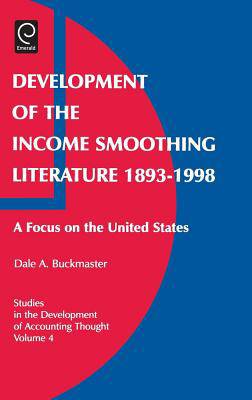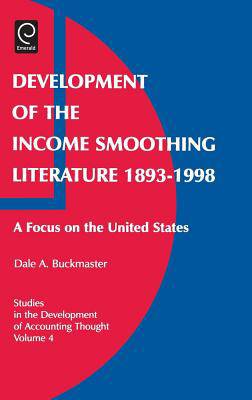
- Afhalen na 1 uur in een winkel met voorraad
- Gratis thuislevering in België vanaf € 30
- Ruim aanbod met 7 miljoen producten
- Afhalen na 1 uur in een winkel met voorraad
- Gratis thuislevering in België vanaf € 30
- Ruim aanbod met 7 miljoen producten
Zoeken
Development of the Income Smoothing Literature 1893-1998
A Focus on the United States
Dale A Buckmaster
€ 302,95
+ 605 punten
Omschrijving
This volume describes the development of accounting thought during the twentieth century by focusing on a relatively narrow and long-lived issue, income smoothing. The task begins with the creation and description of three taxonomies of income smoothing literature in order to identify the context and bounds of the preferences and behavior that are to be the subject of the study. Then a chronological review of English-language literature referring to income smoothing behavior is conducted that covers the period, 1893 through 1998. The review starts with literature discussing secret reserves created so that fat years could pay for lean years and moves to income smoothing as a criterion for accounting choice. This literature on the smoothing criterion provided motivation for some of the earliest modern empirical studies in accounting. Empirical studies of smoothing have continued at a fairly constant rate since 1966 and make up a substantial portion of the literature review. A modification of the conventional smoothing hypothesis is proposed at the conclusion of the narrative that takes into account some relevant variables that tend to be overlooked because of the fragmentation of the literature. An extensive annotated bibliography and other appendices provide important supplements to the narrative.
Specificaties
Betrokkenen
- Auteur(s):
- Uitgeverij:
Inhoud
- Aantal bladzijden:
- 292
- Taal:
- Engels
- Reeks:
- Reeksnummer:
- nr. 4
Eigenschappen
- Productcode (EAN):
- 9780762308040
- Verschijningsdatum:
- 12/09/2001
- Uitvoering:
- Hardcover
- Formaat:
- Genaaid
- Afmetingen:
- 156 mm x 234 mm
- Gewicht:
- 585 g

Alleen bij Standaard Boekhandel
+ 605 punten op je klantenkaart van Standaard Boekhandel
Beoordelingen
We publiceren alleen reviews die voldoen aan de voorwaarden voor reviews. Bekijk onze voorwaarden voor reviews.








